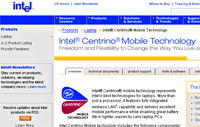 Intel has been bigging up its next-generation laptop technology, claiming they will use 25 percent less power while retaining class-leading performance.
Intel has been bigging up its next-generation laptop technology, claiming they will use 25 percent less power while retaining class-leading performance.
Encouraged by a fast-growing laptop market, the boffins at Intel have been busily overhauling their popular Centrino technology, proudly unveiling ‘Napa’, a new Centrino featuring Intel’s new Yonah microprocessor – the first mobile chip to boast two cores.
The chip is the result of the latest whiz bang technology which is capable of etching circuitry more than 100 times thinner than a strand of Bobby Charlton’s comb-over.
 According to Intel’s marketing chief for mobile platforms, Keith Kressin, this process means that the Napa system (which includes the Yonah processor, its attendant chipset and a new wireless chip) will soak up 28 percent less power than its predecessor while managing to perform 68 percent better
According to Intel’s marketing chief for mobile platforms, Keith Kressin, this process means that the Napa system (which includes the Yonah processor, its attendant chipset and a new wireless chip) will soak up 28 percent less power than its predecessor while managing to perform 68 percent better
“There are benefits to corporate users, there are benefits to consumers,” he added, probably before going on about the benefits to the birds and the bees too.
Twin core machines are growing in popularity (we’ll be getting one shortly), with the technology letting users perform several tasks at the same time without the machine grinding to a halt.
For example, one core could be busying itself by updating a complex spreadsheet, while the other core could be taking care of some heavy duty Photoshop work.
Intel are hoping that the improved battery life will prove attractive to customers too,
 The tough challenge for Intel’s engineers is shoehorning ever more powerful processors into ever-slimmer laptops while improving battery life and managing to dissipate the processor’s heat.
The tough challenge for Intel’s engineers is shoehorning ever more powerful processors into ever-slimmer laptops while improving battery life and managing to dissipate the processor’s heat.
In the last quarter, Intel scooped up an estimated $2.3 billion from sales of laptop processors, with laptop chip revenue providing a growing slice of Intel’s business.
Sales accounted for a third for a third of total processor sales in the third quarter, up from around 27 percent a year earlier.